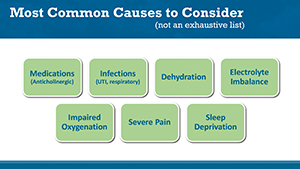Warning signs can be missed as COVID caseloads rise
By JULIE MINDA
COVID-19 outbreaks in many communities across the U.S. had meant spiking inpatient admissions for many hospitals and high caseloads at long-term care sites.
The resulting strain on the labor force can increase the chances that patients with and without COVID will develop delirium, which is an acute and usually temporary state of confusion that has underlying, reversible causes.

That is according to geriatric nursing expert Donna Fick. She has called for clinicians to be extra vigilant in watching for warning signs of delirium during the pandemic. Fick is the Elouise Ross Eberly Endowed Professor at Penn State College of Nursing; director of its Center of Geriatric Nursing Excellence; and editor of the Journal of Gerontological Nursing.
According to Fick, there is evidence that when COVID patient counts surge in hospitals and clinician focus necessarily shifts to lifesaving treatment for the sickest patients, some of the best practices to help prevent delirium can fall by the wayside. The findings are relevant when caseloads overtax staff at long-term care sites too, she said.

She urges providers to watch for the warning signs of delirium, since the condition can have a highly detrimental impact on people's short- and long-term health outcomes. Older patients are much more prone to delirium than younger patients, but patients of any age with any serious medical condition can suffer delirium.
Tough to spot
In October Fick led a CHA webinar on the heightened risk for undiagnosed delirium during the pandemic. She told the audience that delirium comes on quickly. Poor attention, confused thinking, changes in physical functioning and sleepiness can be signs of delirium. In some cases, delirious people experience an altered state of consciousness. Sometimes, she said, when a patient has dementia, early symptoms of delirium can be easily overlooked or ascribed to dementia.
Fick said some of the most common causes of delirium are medication side effects, infections, dehydration, electrolyte imbalance, impaired oxygenation, severe pain and sleep deprivation.
She said that if delirium is not prevented, or if it is not diagnosed and treated quickly, it can lead to complications such as falls, skin breakdown, immobility and death. Delirium's direct health costs to patients may include functional decline, accelerated cognitive decline, stress, fear and falls. Delirium can raise the risk of imminent patient death and it is associated with an increase in long-term care admissions.
The authors of a case study in the Institute for Healthcare Improvement's "The Business Case for Becoming an Age-Friendly Health System" calculated a hospital's average additional costs of care for a hospitalized patient who experienced delirium at more than $22,000. In a Nov. 16, 2011, article in the Journal of the American Geriatrics Society, researchers estimated that "the total direct one-year health care costs attributable to delirium range from $143 billion to $152 billion nationally."
COVID-19 surges
During her webinar, Fick cited "The Epidemic Within the Pandemic: Delirium," an opinion piece by Dr. Sharon K. Inouye published in the May 10 edition of The New York Times. Inouye is a geriatrician at Hebrew SeniorLife in Boston, founder of the Hospital Elder Life Program and a Harvard Medical School professor.
"If you could design a health care system that would generate delirium, you would design exactly the system we have with COVID-19," Inouye wrote.
Social isolation, deprivation of human comfort and communication, staff stress, use of protective gear that obscures faces and voices and minimized time with patients are all consequences of COVID restrictions and protocols at hospitals — and all can promote delirium, according to Inouye.
Inouye wrote that hospital staff were so overwhelmed amid COVID surges that they felt they had no time to spare to calm distressed older adults. Many resigned themselves to using strong sedatives and physical restraints to soothe patients. These practices, too, can worsen delirium.
In the CHA webinar, Fick noted that a study of hospitalized COVID patients in Brazil had found that about one-third had delirium. She said that COVID has been linked to neurological disturbances in some cases and there could be some interplay between those COVID-related neurological disturbances and the development of delirium.
A JAMA Network Open article posted on Nov. 19 found that 28% of patients who reported to an emergency department with COVID had delirium. The study's authors wrote: "Mounting evidence supports the high occurrence of delirium and other neuropsychiatric manifestations with COVID-19."
Vigilance
Fick said the time-tested practices that help prevent delirium should be reemphasized now, particularly amid COVID surges in hospitals and nursing homes.
Prevention begins with vigilance, said Fick, describing two assessment tools that have proven to be highly accurate when administered by frontline hospital staff. The "Two-Item Ultra-Brief Delirium Screen," or the UB-2, is a two-question verbal test usually administered by a nursing assistant. If people miss either question on the UB-2, there may be reason to suspect delirium, and a nurse can administer the verbal "Ultra-Brief Delirium Screen — Confusion Assessment Method" or UB-CAM. Each screening takes less than a minute to administer.
Fick said if an older adult is positive for delirium, as determined by the UB-CAM, it is important to document it and use best practices for treating delirium, including by avoiding medications as possible, mobilizing the patient, looking for the cause of the delirium and finding out what makes the individual feel calm.
Fick said addressing delirium involves removing or treating underlying causes, preventing or remediating complications, restoring cognitive and physical function and managing and understanding delirium behaviors.
She said treatment should be rooted in the patient's goals of care and recommended that those goals be determined in part by using the "4Ms" as described by the Age-Friendly Health System program. The 4Ms are: What Matters to the patient and the patient's Mentation, Mobility and Medication needs.
Upon evaluation, it often is possible to eliminate the use of medications known to put a patient at higher risk of delirium, or to reduce the dose or frequency, she said. To lower the risk of delirium, the patient should be mentally stimulated, including through conversation and mind exercises and activities. Mobility exercises should be part of every patient's day, Fick said, to the extent the patient can move safely.
Advocacy
Fick said that restrictions on visitation due to the COVID threat can be promoting delirium, and not just because isolation increases stress and disorientation and can have other negative impacts on cognitive ability. For instance, without visitors, patients have fewer advocates at the bedside to note behavioral changes, and this can leave patients more vulnerable to undetected delirium.
In the summer and early fall, many hospitals and long-term care sites began to relax near-total prohibitions on visitors. But because of rising caseloads, many facilities have put restrictive visitor policies back in effect.
Fick emphasized that delirium is a preventable condition — even amid a pandemic.
RELATED SUBJECTS:
